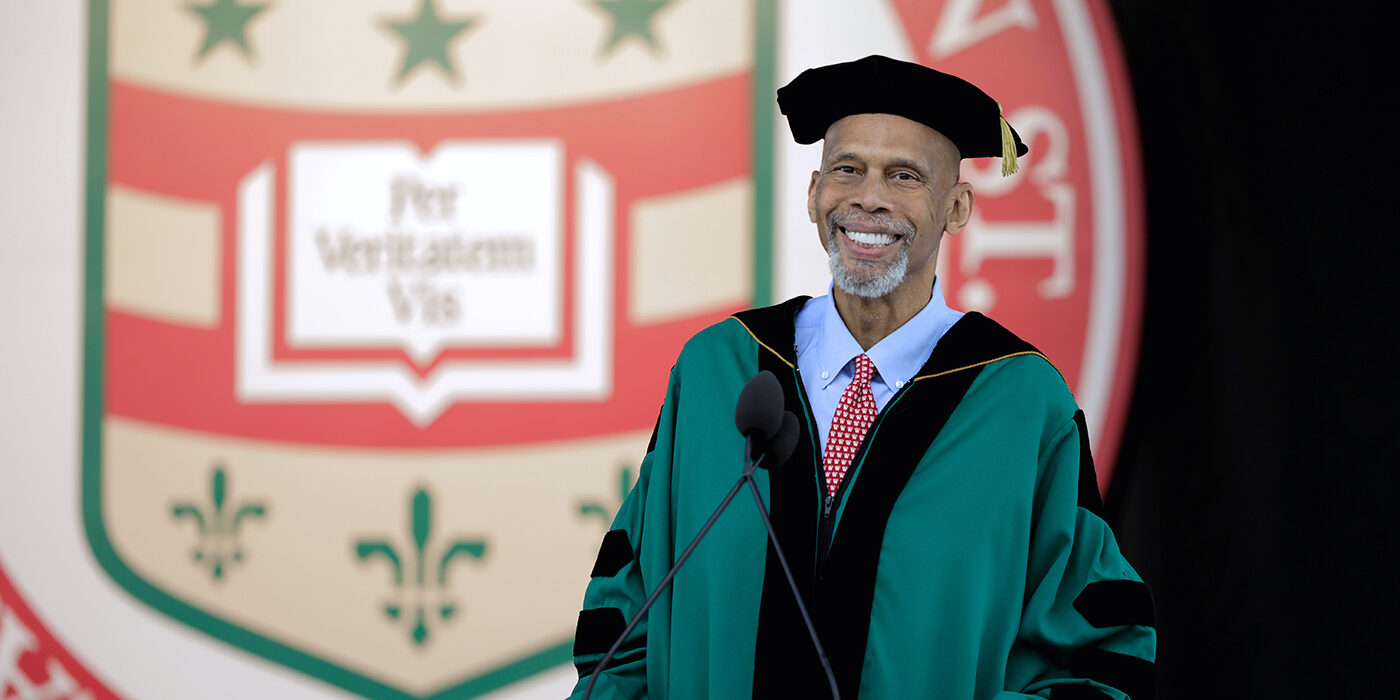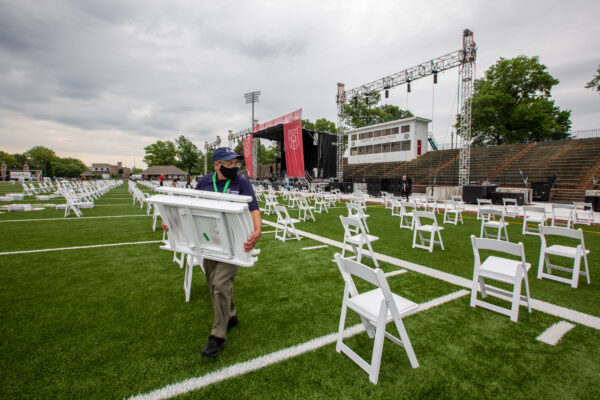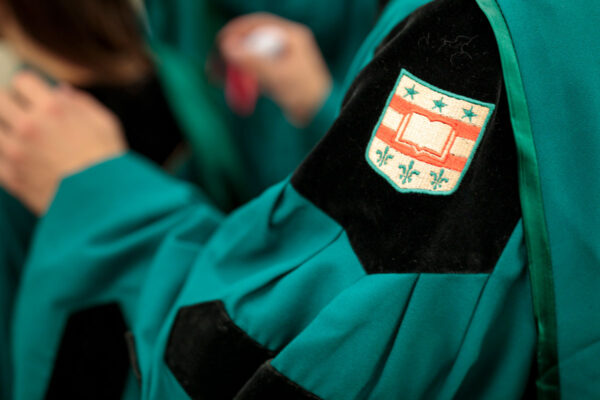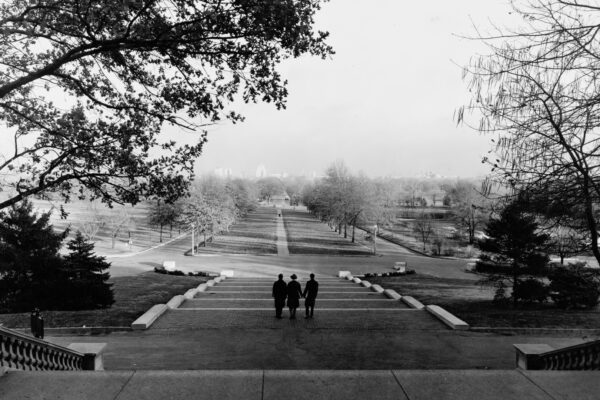At the 160th Commencement — a Commencement like no other in the storied history of Washington University in St. Louis — National Basketball Association great and social justice advocate Kareem Abdul-Jabbar told members of the Class of 2021 to write their own story — but to make sure it went beyond themselves.
“You are the authors of your next chapter and can be whoever and whatever you choose,” Abdul-Jabbar said in a recorded speech presented at eight Commencement ceremonies May 20 and 21. “I hope your story will include a few pages in which you went out into the world and demanded justice, demanded fair play, demanded equality for all people.”
It was a strong and passionate message, reflecting the unprecedented time in which the graduates lived and studied — including the past 14 months under a global pandemic and, as Chancellor Andrew D. Martin put it, “numerous tragedies on our ongoing quest for equity for all people, especially people of color.”
Given that backdrop, Abdul-Jabbar’s remarks were both pointed, when they needed to be, and upbeat, with enough flashes of his trademark, ear-to-ear smile to endear himself to the crowd.
“It wasn’t the college experience you imagined while in high school, dreaming of uncrowded classrooms and crowded parties,” Abdul-Jabbar said to the more than 3,200 undergraduate, graduate and professional students being conferred degrees. “But learning how to endure unpredictable challenges is probably the most important lesson college can teach you. I’m not talking about just surviving, I’m talking about thriving,” said Abdul-Jabbar, who, in addition to delivering the address to the graduates, received an honorary doctor of humanities degree.
The Commencement ceremonies themselves were unlike anything the university had undertaken, beginning with the Francis Olympic Field location, which turned out to be the perfect venue to hold the events safely and smoothly. That all eight events went off without a hitch was an achievement in itself, given what Board of Trustees Chair Andrew E. Newman described as “logistical and regulatorial complexities to put this Commencement together.”
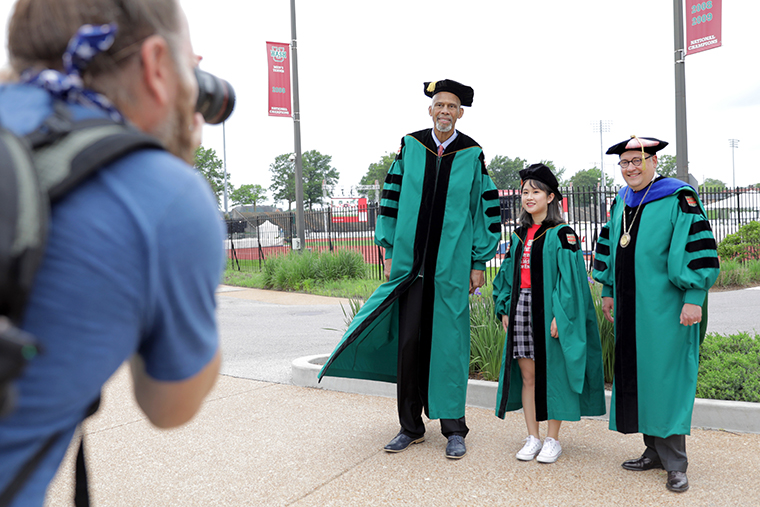
Many of the cherished Commencement traditions were live — processions of students in academic regalia, families snapping pictures, the Washington University Brass Quintet and remarks from Newman, Martin and the respective deans of each’s school ceremony. But a lot of it was presented via video, from Emma Flannery’s stirring rendition of “America the Beautiful” in front of Brookings Hall to the conferral of honorary degrees and student speeches. Commencement 2021 was a hybrid of pomp in the face of unprecedented circumstances.
And the graduates and their families rolled with it, as did Abdul-Jabbar, who taped his speech at the Francis Olympic Field podium on May 19, the day before the ceremonies got rolling. Afterward, he walked around the west end of the Danforth Campus, greeting students who happened by and posing for pictures with Martin and Newman on the Olympic rings.
The highlight of his speech was his relaying of a story from 1967, when he was a 20-year-old college sophomore — and already a well-known basketball player for UCLA. At the invitation of NFL player Jim Brown, he was invited to become part of the Cleveland Summit, a group of Black athletes who gathered to decide whether or not to support Muhammad Ali’s stance as a conscientious objector to the Vietnam War.
“I felt overwhelmed by the responsibility,” Abdul-Jabbar said. “Who was I, a kid just out of my teenage years, deciding the fate of anything, let alone one of the most famous Black men in the world? Wasn’t that best left up to older, wiser people?
“But there I was, along with older, wiser people, listening to Ali talk about his faith, his unwillingness to kill, and his willingness to give up his title, lose millions of dollars and face years of imprisonment.”
Abdul-Jabbar was animated as he relayed the story of how Ali convinced the group that his intentions were pure. “Even when the government guaranteed he wouldn’t have to go to Vietnam, that he would only do exhibition boxing, he refused. He wouldn’t allow himself to be used as a poster boy to recruit others to do what he wouldn’t do.
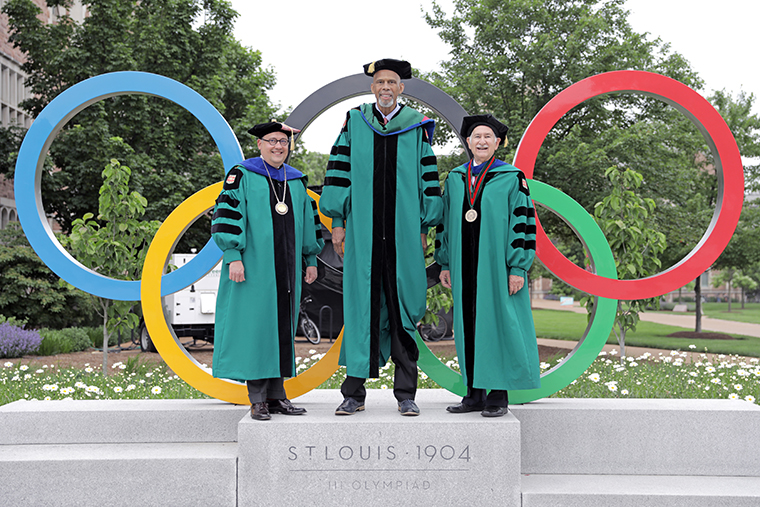
“By the time we were done grilling Ali, we all agreed that he was not just sincere, but uncommonly courageous,” Abdul-Jabbar said. “For me, that was a graduation. I had been looking for some way to express my frustration at the country’s inequities, my helplessness at the injustice all around me, my anger at the physical dangers that my people and other marginalized people faced just going about their daily business.”
It would turn out to be a seminal moment in Abdul-Jabbar’s life, one in which he learned that his talent came with great responsibility. “The only reason I was part of the Cleveland Summit and given a public platform to express my opinion was because I was very good at stuffing a basketball through a hoop,” he said. “So, if I wanted to continue making my life have a positive impact on my community, I would stuff more balls through more hoops than anyone else.”
And when that chapter of his life was finished, he reinvented himself yet again as a writer and an activist, another “graduation,” he said, one of the many he told the Class of 2021 that they, too, would have in their lives.
“So many doorways in life, so many paths,” Abdul-Jabbar said. “But they all have similar characteristics in common: they will challenge what you think you know about the world and about yourself. Each time you open that new door, you’re a different person from the last time.”
It was a sentiment echoed by Martin in his address to the Class of 2021, delivered live at each ceremony. “I challenge you not to be normal,” Martin said. “Instead, be extraordinary. Push for change. Make a difference in your field and in your community. And emulate our WashU mission wherever your future takes you.”
“Education isn’t just about learning the facts of history,” Abdul-Jabbar said. “It’s about understanding what those facts mean to the future of you and your community.
“Understanding your personal history, your cultural history, your country’s history, your world’s history, helps you put it in perspective where you want to go, what you want to do,” Abdul-Jabbar said.
“And, most importantly, who you want to be.”
Visit here to read Abdul-Jabbar’s full speech.
Visit here to read Chancellor Martin’s address to graduates.
Visit here to read Senior Class President Michelle Wang’s address to graduates.
Note: A collection of photos from the 2021 Commencement ceremonies will be available for viewing and downloading by Friday, May 28.
